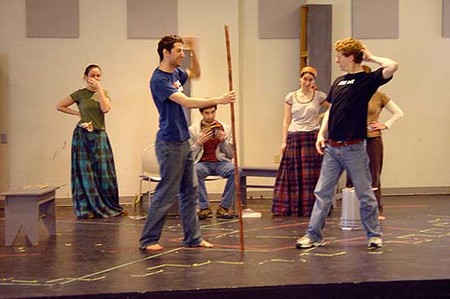At last the play transfers from rehearsal room to stage. The stage or a portable stage will be a pretty chaotic place before dress rehearsal, with stage management and the technicians sorting out scenery, props, lighting and sound, but the actor must find time to acclimatize himself to the setting. In the rehearsal room it’s usual for the stage manager to mark out the set or sets on the floor, exactly the same size as they will be on the stage, but imaginary scenery is a very different thing from real doors, walls, windows and backings, so the actor must check everything he physically uses or touches, particularly doors. He must check the positions of property tables, and practice with the real props he’s going to use on stage, as they will probably be different from the rehearsal props in size and weight, and all ‘business’ must be meticulously rehearsed before dress rehearsal. Furniture, especially sitting furniture will feel different from the usual hard chairs of the rehearsal room, so practice all ‘sits’. Check the amount of time it takes to get from the dressing room to the stage, the position of anything stored in the wings, and the means of getting from one side of the stage to the other. The stage and backstage are now your workroom, so you must know the area intimately for your own comfort and security.
Make sure you know all movements of scenery, trucks, flying pieces, in fact anything that moves, as the stage can be a dangerous place.

Get used to the auditorium. The actor enters a dark void, but faces a fierce battery of lighting which can be disorientating. Some plays are very much behind the imaginary ‘fourth wall’, where the audience are onlookers; other plays invite much more contact with them, that is, with the audience almost a participating character. The actor must also check out the auditorium for sound levels, to determine how much voice to use. Bear in mind that a full house needs louder speech than an empty one, and that many tiny fifty-seat fringe venues need almost no projection and an almost conversational level of speech can be clearly heard.
An actor in the theatre has an obligation to arrive at the theatre on the ‘half’, that is, thirty-five minutes before the show starts, but any actor playing a demanding part should aim to arrive early, to get into costume, to apply a complicated make-up if it’s called for, above all, to focus his or her mind on the play, the character, his fellow actors. To the actor in the theatre, his dressing room is a sanctuary where he can rest, prepare and concentrate, so sharing a dressing room needs tact and consideration.
All good actors have suffered from stage fright at some time or other. I have already looked at ways of dealing with it. That most immaculate of elegant comedy actors, Rex Harrison, said that he endured it throughout his career, and many stars have had incapacitated periods when they could only work for the camera. Laurence Olivier and Ian Holm, two Masterly actors, both suffered long periods of this miserable affliction. Indeed, whilst some roles are easy to play, the actor can never be complacent, and a self-satisfied and conceited actor is probably a careless and sloppy actor. The buttresses against the actor’s major affliction are: thorough and detailed preparation and research, never-ceasing searching for the highest technical skills; a proper balance between alertness and bodily and emotional relaxation, and last, the knowledge that the audience very probably admires the actor for his or her courage, for transporting them into a world of imagination and understanding.